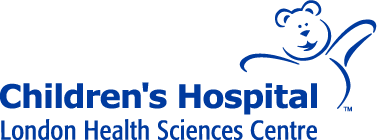Disclaimer to the Online Edition
This Manual has been designed for use in the NICU at London Health Sciences Centre (LHSC), London, Ontario, Canada, and represents clinical practice at this institution. The information contained within the Manual may not be applicable to other centres. If users of this Manual are not familiar with a drug, it is recommended that the official monograph be consulted before it is prescribed and administered. Any user of this information is advised that the contributors, Editor and LHSC are not responsible for any errors or omissions, and / or any consequences arising from the use of the information in this Manual.
Synagis®
Indication
- Synagis® is indicated for the prevention of serious lower respiratory tract infection caused by the respiratory syncytial virus (RSV) in paediatric patients at high risk of RSV disease.
- In Ontario, eligible patients include:
- Infants born prematurely at less than or equal to 32 weeks completed gestation and aged less than or equal to 6 months at the start of or during the local RSV season
- Infants 33 – 35 completed weeks gestation and aged less than or equal to 6 months at the start of or during the local RSV season, who do not live in remote communities and have a Risk Assessment Tool Score of 49 -100
- Infants 33 – 35 completed weeks gestation and aged less than or equal to 6 months at the start of or during the local RSV season who live in remote communities
- Children less than 24 months of age with Trisomy 21
- Children less than 24 months of age with bronchopulmonary dysplasia/chronic lung disease (BPD/CLD) and who have required oxygen and/or medical therapy specifically for chronic lung disease within the 6 months preceding the RSV season
- Children less than 12 months of age with hemodynamically significant cyanotic or acyanotic congenital heart disease (CHD): requiring corrective surgery or are on cardiac medication for congestive heart failure or diagnosed with moderate to severe pulmonary hypertension
- In SW Ontario the RSV season generally extends from November to April
- Synagis® is not effective for the treatment of established RSV disease nor does it prevent non-RSV respiratory illness or otitis media
Clinical Pharmacology
- Synagis® is a humanized monoclonal antibody directed against a specific protein site on the respiratory syncytial virus
- Synagis® administration does not appear to alter the response to any vaccines, and routine childhood immunization schedules do not need to be altered
- the IMpact -Trial of RSV prophylaxis showed a 6.3% (8.1% vs 1.8%) decrease in RSV hospitalizations in premature infants without BPD who received Synagis® compared to infants who received a placebo
Side Effects
- The frequency of various adverse effects (eg, rash, pain, wheeze, apnea, local site reactions) were no different between the Synagis® and placebo groups in the IMpact -Trial
- Anaphylactoid reactions following the administration of Synagis® have not been observed. However, as with the administration of other protein containing products, anaphylaxis or a severe allergic reaction is a possibility. If this occurs, epinephrine administration is recommended.
Dose and Administration
- 15 mg/kg IM monthly for 5 consecutive doses during the RSV season
- Do not dilute the product
- Do not shake the vial
- store Synagis® vials in the refrigerator. Do not freeze
- To minimize product wastage, try to arrange for 2 eligible patients to receive their injections on the same day
Supplied As
- 100 mg and 50 mg vials of solution for injection
- Both vials contain a solution for injection with a concentration of 100 mg/mL
- Synagis® solution for injection does not require reconstitution
References
- IMpact-RSV Study Group: Palivizumab, a Humanized Respiratory Syncytial Virus Monoclonal Antibody, Reduces Hospitalization From Respiratory Syncytial Virus Infection in High-risk Infants. Pediatrics, 102(3);1998:531-537.
- Synagis® (Palivizumab) Product Monograph. Abbvie, St. Laurent Qc, April
